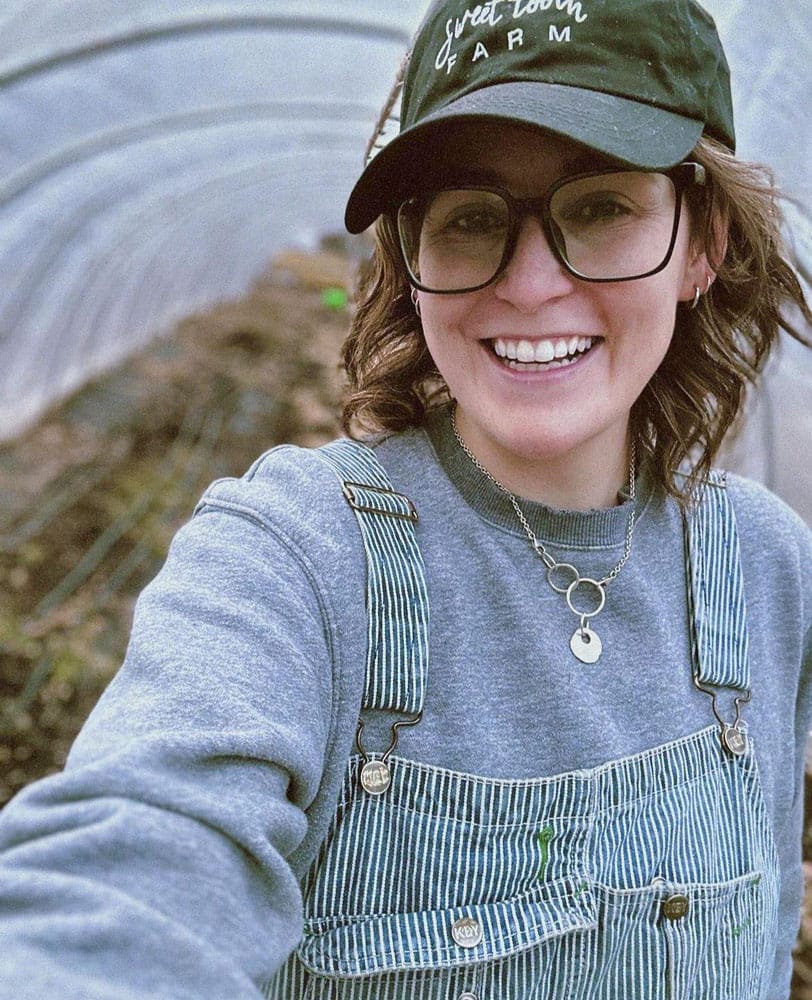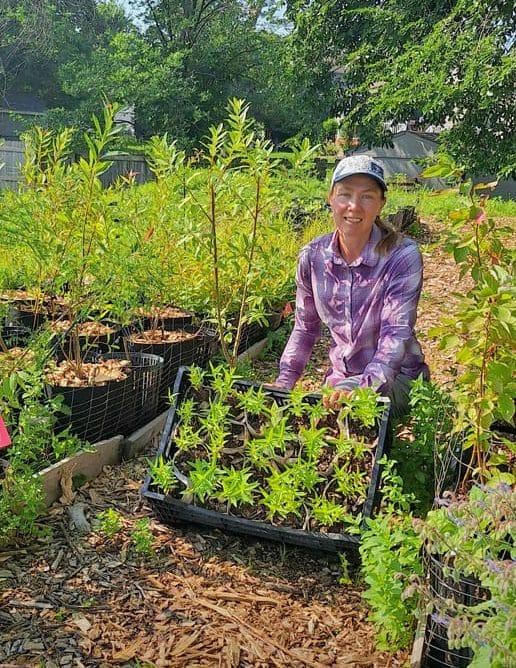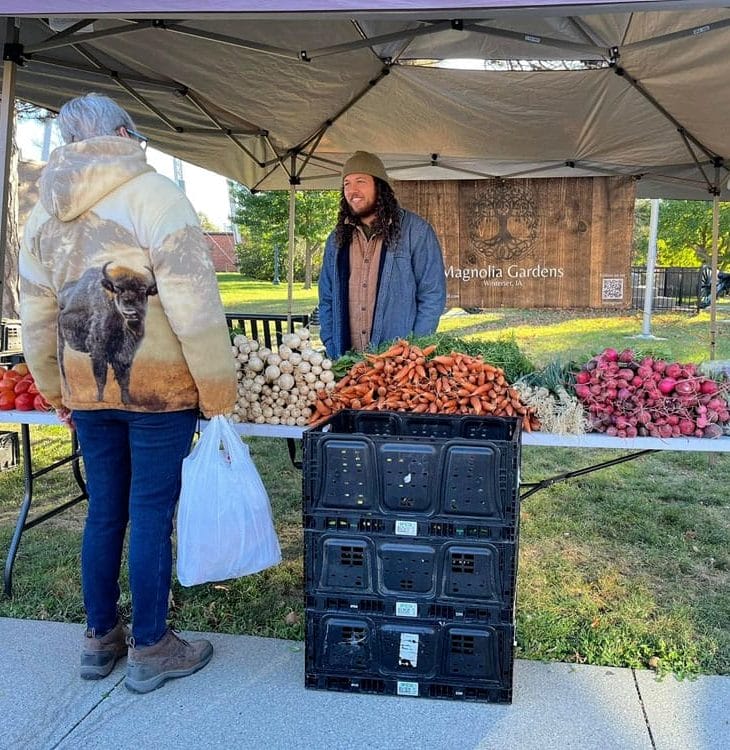Grow Where You’re Planted
Urban farmers face the same challenges as their rural peers – weather, finding markets, weed and pest control, accessing land and more. But they also face unique constraints. As they seek to farm in cities and towns, these urban growers must run a gauntlet of city, state and county rules, zoning laws and development pressures, all of which can complicate their desire to farm.
Why do they persist? For the PFI members profiled here, connection to land and community drive them to grow within the spaces they’ve found.
Monika Owczarski | Des Moines, Iowa
Monika Owczarski of Sweet Tooth Farms grows vegetables on several small plots in the middle of her Des Moines neighborhood. She started the farm in 2016, guided by a desire to reinvigorate a small, neglected city-owned park adjacent to her property while providing food for her community.
In starting the farm, Monika transitioned from gardening in her own backyard to farming for others. “There’s a really big learning curve from gardening to scaling up and farming,” she says, citing the challenges of prepping the space, working with neighbors and developing markets. Many of her neighbors are immigrant families who want fresh produce and are used to open-air markets. So she started promoting her new farm through conversations and flyers – translated into 10 of the 30 languages spoken in the community.
Within a few years, her farm stand grew into a community space, with people lining up around the block. Through her relationship with Des Moines Parks and Recreation, she received an offer from the city to grow on two other industrial sites. By 2020, Monika was farming a little over 2 acres and had started a neighborhood farmers market and community “refrigerator,” a 24/7 free pantry for those in need. She was also mentoring others and working with local restaurants.
In 2021, the City of Des Moines terminated all agricultural leases on city-owned land to free up potential space for development. The news was “emotionally devastating,” Monika says. As she was scrambling to figure out her next move, she received a text from someone in the neighborhood who offered to sell her a small lot. “We were able to survive because my neighbors felt that trust with me and offered solutions,” she says. “They really stepped up, so I didn’t have to completely close up shop.”
Today Monika continues to grow for her community on a smaller scale, and is frank about the challenges of urban farming. Unlike in rural areas, for instance, she says an urban farmer has to seek permission from zoning boards to build a high tunnel, add waterlines or make other infrastructure improvements. “I think a lot of urban farmers may be struggling at this scale. If we don’t have more space to make this bigger, and if I’m paying to do this, this is an expensive hobby at some point.”
Why does she persist? “I have such a deep, deep love for this neighborhood,” Monica says. “I don’t think I have delusions about what I can do, but I am a grateful visitor and admirer of all of these cultures. I think of the five or six grandmas who were just here, picking up produce.…I can’t put a price on that, but it’s so nourishing as a human to have that. That’s golden to me.”
Lee Goldsmith | Grimes, Iowa
Lee Goldsmith has also found ways to grow in small spaces thanks to connections within her community. In August 2022, she started Native Legacy Tree and Perennial Nursery, LLC in Grimes, after working for other nurseries for 12 years. On ¼ acre, she grows a variety of native Iowa trees, prairie plants and woodland flowers in containers.
She first connected with Practical Farmers as she sought land to start her business. Working with PFI’s farmland access navigators, she received support from someone whose job is to help guide people in their search for land to start or grow a farm. “It was so helpful, the encouragement,” Lee says of her land access navigator, “and her advice to tell everyone you know that you’re looking for land.”
Lee heeded that advice and started asking people in her community. Eventually, those conversations paid off. “I was just talking to a neighbor, and someone he knew had a business with a large lot,” Lee says. She now has an informal arrangement with the business owner. “Fortunately, my crops are in containers, so I can pick up and get out if I had to,” she says. “But I really thought hard about what kind of an agreement … would work for him.”
Lee’s focus on native perennials further complicates the regulatory hurdles. Under the Iowa Department of Revenue’s definition, her business is technically not a farm since she grows some plants that aren’t table food. But to the U.S. Department of Agriculture’s Farm Service Agency, it is.
Wayfinding is tricky,” Lee says. “In most cases, I’m an LLC selling a product just like Tupperware.” Because of her farm’s tiny size, she also doesn’t qualify for Iowa’s DriftWatch registry, which lets farmers with sensitive crops register their operations so pesticide applicators can take extra care when spraying fields near these sites.
Lee is now looking to expand onto 2 acres. The location needs to be close to her home because she works a second part-time job and must also juggle family life and plant care. Many of her sales are also local. She offers other urban farmers this advice: “Reach out and talk to people. There’s an industry of small nursery growers in the state, and I’m finding connection.”
Stephen Hansen | Winterset, Iowa
Stephen Hansen started Magnolia Gardens in his yard in Winterset, Iowa, in 2022 on about one-eighth acre. He grew up in the foster system in Winterset, and was adopted by a family in Greenfield who grew gardens, chickens, sheep, cows and fruit trees. This connection sparked Stephen’s interest in food systems.
He initially focused on large retail operations like Whole Foods and large-scale vegetable operations in Michigan and Iowa. But in time, Stephen wanted to think smaller. “There’s a lot of waste,” he says of those large operations. Authors and influencers like Curtis Stone and Jean-Martin Fortier inspired him to think about starting a smaller-scale farm, and in 2022, he moved back to Iowa, bought the house in Winterset and worked for PFI members Jenny Quiner of Dogpatch Urban Gardens and Dale Raasch of Bridgewater Farm.
Like many beginning farmers rural or urban, land access was one of his biggest barriers to getting started. So the plan was to use as much yard space at his home in Winterset as possible. “We turned it into gardens, raised compost beds,” Stephen says. “We grow a lot of lettuce, beets, carrot, radish, cilantro, dill, herbs – anything that will grow in a 60-day window.” In 2022 he and his family started taking vegetables to markets.
Stephen’s dream is to expand onto 3-5 acres, in a place where multiple farms can operate together on one piece of land. “My life goal is to meet people around food while helping local food systems,” Stephen says. His vision, which he calls “getting local,” features an indoor market connecting farmers, bakers, makers and community in one place.
This fall, Stephen and his family are moving to Humansville, Missouri, where his partner Sarah’s family farms and lives. “Without my partner’s access to land, I would still be looking,” Stephen says. He adds that he and Sarah plan to stay connected to their communities in Iowa. “I’m super passionate about seeing that through. It’s a busy life, but I have a lot of energy to give to this.”



